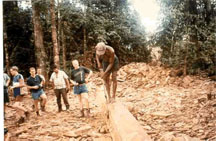By Eileen Cox
It occasionally happens that a brilliant student chooses his profession, travels abroad, qualifies in the chosen field, then returns to Guyana to find to his dismay that there is no opening for him in that field. Recovering from his disappointment he perforce maks a second choice and finds himself excelling in that field.

In the cast of Fitz H Ogle, he studied at a university in Brazil, graduated with second class honours as an agronomist, returned to Guyana and was selected to fill a vacancy in the Botanic Gardens. Recovering from the shock, he chose the teaching profession with its low salary.

“It is a fact that natural science taught in tropical schools suffers through having been evolved from that of temperate countries, and this may be said not only of its content, but of the methods used in teaching it.
The long ‘dead’ winter of the temperate zones, connected to a commonly urban environment, has encouraged an indoor approach to the subject, based on the study of dead specimens and of books which we who teach in the tropics have less need to impose on ourselves. We are fortunate to work where direct contact with plants and animals in their natural habitats is usually possible at all seasons of the year.
“To exploit this asset, especially when introducing biology in the fourth year of secondary school, would seem to hold considerable advantages.
Then our students are most likely to come to appreciate the subject for what it is – a study of plants and animals by man – rather than as information to be accepted and memorized. A prior acquaintance with living plants and animals would provide the soundest possible background for the more systematic study of later years.
“Guyana today, a developing country having come out of a period of colonialism, greatly needs to take careful and accurate stock of its resources.
The development programmes are placing increasing emphasis on agriculture, particularly the need for its diversification, but it is obvious that in order to accomplish diversification of agriculture and improvement of our natural resources, we need to know, among other things, exactly what plants (edible and otherwise), animals and soils we have in Guyana, where they are and what are their characteristics.
With such knowledge we can develop techniques for maximizing our gains from the soil, conducting research, promoting eco-tourism, creating employment and thus, go a long way towards real economic independence.
“Towards this end, Evergreen Nature Study Club, A Way of Life was formed solely by me in September 1997 and soon taken to the North Georgetown Secondary School from where I obtained an early education before pursuing postgraduate studies. However, membership in the club is not limited to students of the school, but open to any interested person at least 14 years of age.
The outreach programme offers a one-year certificate course (see study outline) with emphasis on practical studies including vacation camps in the rainforest. The National Agricultural Research Institute, Iwokrama International Centre and UNESCO participate in the programme as signatories on certificates.
“It is my belief that there must be a change of attitude with regard to appreciation of our tropical environment/biodiversity and agriculture along with consumer tastes – what we eat. It is this whole idea of studying together for the natural good of ourselves, the human resource.
“It is a refreshing experience. Come along.
Fitz H Ogle, Dip Agri, Assoc MSc
Club Chairman”
http://www.sdnp.org.gy/evergreen/





